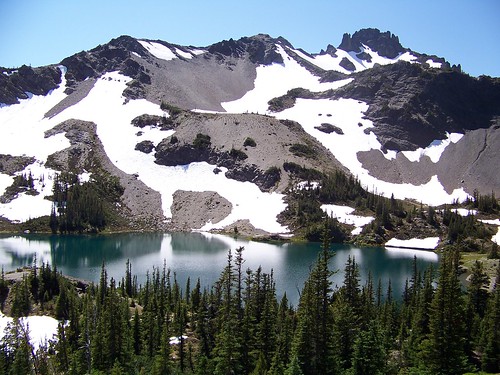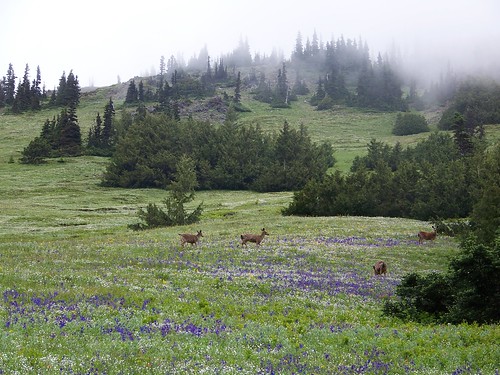
As I reach the pinnacle of this stretch of trail my heart is racing, my calves are burning, and my face is dripping with perspiration. I feel strong. I remove the pack from my aching shoulders and grab my water bottle. I am refreshed as I gulp it down. This is sweet mountain water that will eventually trickle down to taps in the city below. Up here, it’s clear and icy cold and the only type of water I have consumed during my five-day wilderness experience.
I lower the bottle from my mouth to admire my accomplishments. The top of the mountain pass has rewarded me with spectacular views of surrounding peaks. I feel alone, but not forlorn. I unravel the contents of my pack and begin to set up my final camp.
When defining wilderness one can easily speak of boundaries; after all, wilderness boundaries are clearly defined on maps and marked on trails. Olympic National Forest has five wilderness areas that were established by Congress in 1984. This year marks the 30th anniversary of their designation.

The definition of wilderness also extends beyond boundaries. Those who never visit these areas benefit from the pristine water and air that these untrammeled ecosystems provide. Many Americans who never set foot within a federally designated wilderness area appreciate simply knowing such wild places continue to exist, forever connecting our society to its natural heritage.
To further define the concept of Wilderness one can also draw from the Wilderness Act of 1964, which provided a legal means to designate protected Wilderness areas. The act describes the qualities, values and characteristics of these wild areas that continue to be used today when Wilderness is designated and managed.
These eloquent phrases from the Wilderness Act, help land managers identify and manage wilderness areas, but they do not entirely capture the meaning of these wild places. To fully realize the benefits of wilderness, one must explore within their boundaries.
“A wilderness, in contrast with those areas where man and his own works dominate the landscape…Where man himself is a visitor who does not remain…[That is] affected primarily by the forces of nature...[and] has outstanding opportunities for solitude or a primitive and unconfined type of recreation...”

Wilderness is an experience and it must be felt: the air breathed, the rivers sipped from, the peaks climbed, the natural sounds attended to. Wilderness is an area to realize goals. It’s a place for reflection, physical and mental challenge, and renewal. Wilderness is emotional. It’s a place for jubilation, doubt, wonder, inspiration.
Wilderness builds relationships. It’s a place to know yourself, know your companions, and know your surroundings.
Wilderness is a celebration. It’s a place to celebrate America’s foresight to preserve its special places, and to recognize 50 years of protection. Wilderness is a place one regrets leaving—even after five days of complete solitude, even after long miles and achy joints, even after living only off what you carry on your back, even while knowing a soft bed and four walls await.
The sun has set and I lay outside my tent reflecting on my time in the wilderness. I hike out tomorrow. This knowledge fills me with a sense of accomplishment, but sadness also creeps in. In my short time here, I have grown accustomed to traveling the backcountry.
But this is not my home and like any polite guest I must not over-stay my visit. I find solace knowing that I am always welcome.
Editor’s note: Alex Weinberg is a recreation specialist on the Olympic National Forest and has worked as a backcountry ranger and has coordinated wilderness inventory in five wilderness areas.

